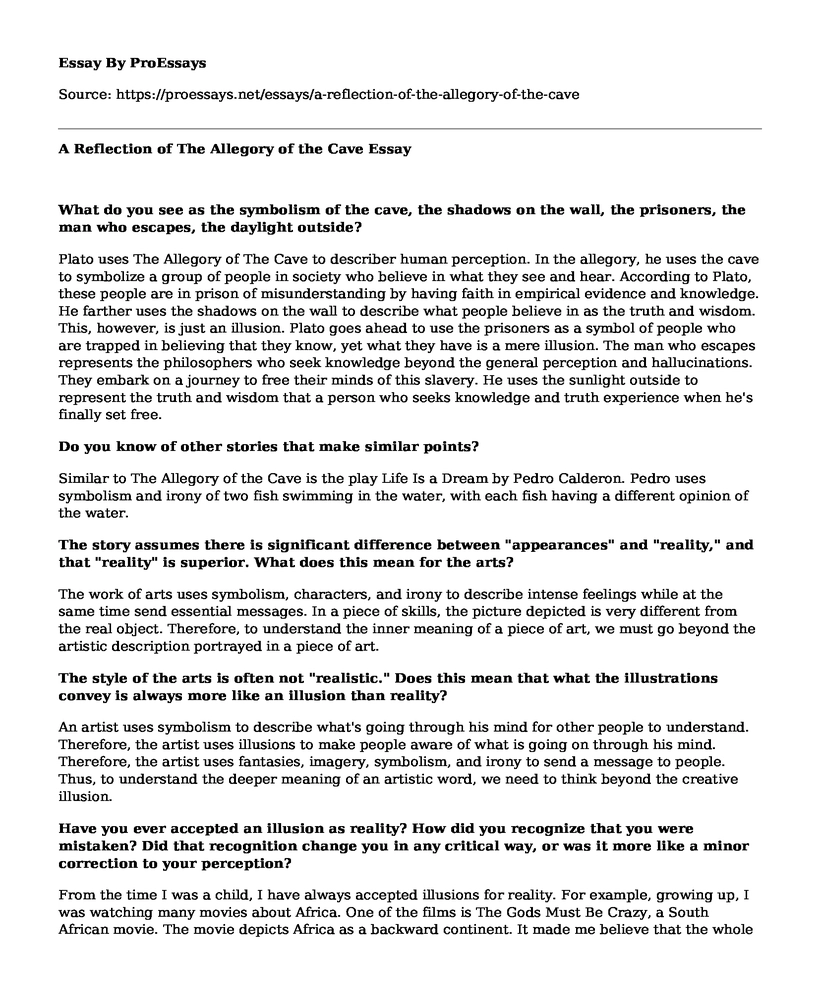What do you see as the symbolism of the cave, the shadows on the wall, the prisoners, the man who escapes, the daylight outside?
Plato uses The Allegory of The Cave to describer human perception. In the allegory, he uses the cave to symbolize a group of people in society who believe in what they see and hear. According to Plato, these people are in prison of misunderstanding by having faith in empirical evidence and knowledge. He farther uses the shadows on the wall to describe what people believe in as the truth and wisdom. This, however, is just an illusion. Plato goes ahead to use the prisoners as a symbol of people who are trapped in believing that they know, yet what they have is a mere illusion. The man who escapes represents the philosophers who seek knowledge beyond the general perception and hallucinations. They embark on a journey to free their minds of this slavery. He uses the sunlight outside to represent the truth and wisdom that a person who seeks knowledge and truth experience when he's finally set free.
Do you know of other stories that make similar points?
Similar to The Allegory of the Cave is the play Life Is a Dream by Pedro Calderon. Pedro uses symbolism and irony of two fish swimming in the water, with each fish having a different opinion of the water.
The story assumes there is significant difference between "appearances" and "reality," and that "reality" is superior. What does this mean for the arts?
The work of arts uses symbolism, characters, and irony to describe intense feelings while at the same time send essential messages. In a piece of skills, the picture depicted is very different from the real object. Therefore, to understand the inner meaning of a piece of art, we must go beyond the artistic description portrayed in a piece of art.
The style of the arts is often not "realistic." Does this mean that what the illustrations convey is always more like an illusion than reality?
An artist uses symbolism to describe what's going through his mind for other people to understand. Therefore, the artist uses illusions to make people aware of what is going on through his mind. Therefore, the artist uses fantasies, imagery, symbolism, and irony to send a message to people. Thus, to understand the deeper meaning of an artistic word, we need to think beyond the creative illusion.
Have you ever accepted an illusion as reality? How did you recognize that you were mistaken? Did that recognition change you in any critical way, or was it more like a minor correction to your perception?
From the time I was a child, I have always accepted illusions for reality. For example, growing up, I was watching many movies about Africa. One of the films is The Gods Must Be Crazy, a South African movie. The movie depicts Africa as a backward continent. It made me believe that the whole of Africa was like a forest. I thought that you could never find any airport or roads or vehicles in Africa. However, I came to know the truth. Africa, though developing, does still have modern facilities. This truth made me change my view of Africa in a significant way.
Do you think that people today live in a world of "shadows"? Are we imprisoned in some way, with our minds shackled?
It is still sad that people live in a world of illusions in the present day. The youths are imprisoned by drugs, sexual immoralities, and violent acts, believing that such actions make them stronger and superior.
Works Cited
Gendler, Alex. "Plato's Allegory of the Cave."
TEDEd, Educator, Alex Gendler., Director, John R. Dilworth., Animator, Pilar Newton., Sound Designer, William Hohauser., Script Editor, Addison Anderson, 2015 https://ed.ted.com/lessons/plato-s-allegory-of-the-cave-alex-gendler.
Cite this page
A Reflection of The Allegory of the Cave. (2022, Mar 27). Retrieved from https://proessays.net/essays/a-reflection-of-the-allegory-of-the-cave
If you are the original author of this essay and no longer wish to have it published on the ProEssays website, please click below to request its removal:
- Being Young by Carson McCullers Essay
- A Comparison of Flannery O'Connor's Good Country People and A Good Man Is Hard to Find
- How Sociology Enables One Understand Themselves and the Social World Essay
- Psychological Analysis of "A Narrow Fellow in the Grass" and "O to Be A Dragon"
- Literary Analysis Essay on Fight Club: Exposing Masculinity Through Satire
- Tuskegee Experiment: A Controversial Study of Research Ethics - Essay Sample
- Essay Sample on Understanding Socio-Cultural Theories: Impact on Human Behavior & Learning







